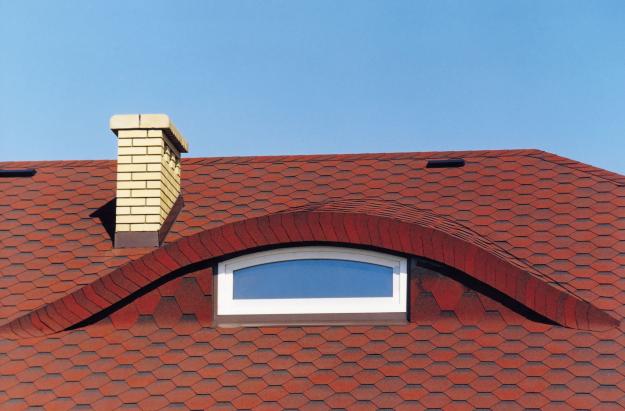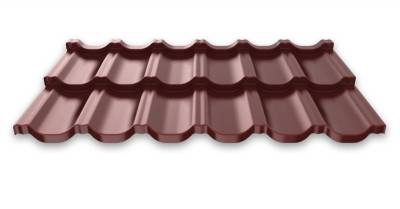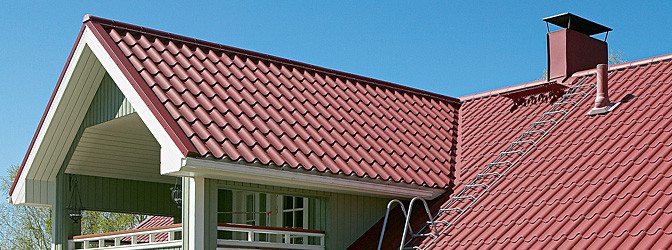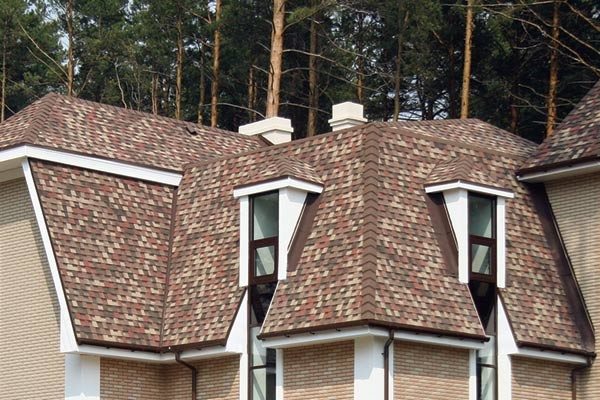 The choice of roofing material is now huge, and to decide what the roof of the house will be covered with, preferably, even during the drafting of the project. Let's try to figure out what is better soft roof or metal tile?
The choice of roofing material is now huge, and to decide what the roof of the house will be covered with, preferably, even during the drafting of the project. Let's try to figure out what is better soft roof or metal tile?
This is an important question that many builders ask themselves. But in life, after all, there is nothing unambiguous, and therefore the answer cannot be definite. The fact is that the choice of material necessary for covering the roof depends not only on the taste of the owner, but also on many additional factors.
What factors can influence the choice of roofing materials?
- Price. It is rare that a construction project has an unlimited budget, so the cost of roofing material is one of the determining factors;
- Building type. It is clear that when choosing a roofing material for a residential building and, for example, for a garage, the evaluation criteria will be different.
- roof service life. This factor is usually related to the cost of the selected material. So, the cheapest roofing options usually last 10-15 years, while some roofing can last more than 100 years.
- Climatic conditions. When choosing a roofing material, local weather conditions should be taken into account - the expected wind and snow load, the frequency of rainfall, temperature changes, UV radiation intensity, etc.
- Roof structure. The choice of material for covering roofs of complex shape must be approached with particular care.
- Features of the supporting structures of the roof. For heavy roofing materials, reinforcement of truss systems will be required.
In addition, it is worth considering factors such as the environmental safety of the roofing material, as well as aesthetic considerations.
Thus, in order to decide whether a metal tile or a soft roof is better suited as a roofing material, you will have to evaluate all of these factors.
Cost of materials

The first thing developers usually start with is the cost of materials. At first glance, everything is simple: metal tiles are cheaper than soft tiles.
However, one should not rush to conclusions. The fact is that soft tiles are a very economical material and the percentage of waste is very small when laying.
Moreover, the installation does not require the purchase of a large number of components. But when laying metal tiles, a significant amount of valley and ridge elements is required, and this material gives more waste. As a rule, when determining the amount of roofing material in the case of metal tiles, a correction factor of 1.5 is used, that is, you need to buy material one and a half times more than the roof area.
Thus, evaluating the economic aspect of the problem, which is better than a metal tile or a soft roof, it is advisable to draw up a detailed calculation of all the necessary materials and, only then, make a final decision.
Cost of work
The second factor in assessing the economic feasibility of choosing a particular material is the cost of the work of roofers. As a rule, covering a roof with a metal tile is cheaper by about 30 or even 50 percent than performing the same work using bituminous tiles.
However, even here it is impossible to decide unequivocally, since if the roof has a complex profile, characterized by a large number of fractures and bends, then the cost of laying metal tiles will increase significantly.
This is due to the fact that it will be necessary to cut sheets of roofing material and install additional elements, while when using a soft roof, sheets can simply be bent.
Performance characteristics of materials
Of course, every homeowner wants the roof to be strong, airtight and serve for a long time without requiring repairs.
When solving the problem of a metal tile or a soft roof - which is better, you need to familiarize yourself with the performance characteristics of these materials.
Metal tile and tips for choosing this material

The metal tile is very popular among developers, as it has many significant advantages, these include:
- Resistance to external atmospheric influences;
- Durability;
- Easy installation;
- Light weight;
- Wide range of colors.
On the market today you can find this roofing material of domestic and imported production.
Among the most popular types of material, brands:
- Ruukki;
- Scandinavia;
- Metehe;
- Weckman and many others.
When choosing this material, you should listen to the following recommendations of experts:
- The thicker the steel sheet used in the production of metal tiles, the less likely it is that the coating will be damaged during transportation and installation.
Advice! Experts consider the thickness of the steel sheet to be 0.48-0.5 mm as the "golden mean" between the price of the material and its quality.
- The type of coating has a great influence on the durability of the material. Today, the most common option is polyester (PE) coated metal roofing. A more expensive, but also more durable option is pural coated material (PUR). In addition, metal tiles with a matte finish (MatPUR, Purex, MatPE) have recently come into fashion, such a finish looks more noble and aristocratic.
- It affects the durability of the material and such an indicator as the amount of zinc. So, according to European standards, this figure should be equal to 275 grams per square meter of steel sheet. A metal tile made of steel with this characteristic will last at least half a century.
- Another important indicator of durability is the sheet geometry. Sheets of material when laying should provide the greatest degree of tightness.
Advice! When buying, carefully inspect the packaging with metal tiles. Sheets of material should lie one to one without the formation of gaps.
Materials for creating a soft roof

When choosing an option with a soft roof device, it will be even more difficult to decide on the choice of material. After all, you will have to additionally decide which soft roof is better?
On the one side soft roof - these are quite cheap, but not too durable roll coatings - roofing material, linocrom, glass hydroisol. On the other hand, a soft roof is also an elite bituminous tile and a fairly affordable ondulin.
As a rule, roll materials are selected if the task is to carry out roofing work quickly and inexpensively. In this case, you should prefer such budget materials as bikrost or linocrom.
The design of all rolled roofing materials is very similar: oxidized bitumen is applied to the base, to which various additives that improve the properties of the material can be added. As a basis, as a rule, polyester, fiberglass or other non-woven materials are used.
The advantages of these materials include their low cost and simple installation, but the disadvantage is a relatively short service life.
Ondulin is not a type of material, but a trade brand. However, most developers call any bituminous sheet with a wavy profile that way.
This material also belongs to the economy class, so it is often chosen as a roofing material for a variety of outbuildings. The warranty period of ondulin service is 15 years, but in practice, roofs with this roofing can last for several decades.
To the virtues roofing materials additionally, its environmental safety and ease of installation can be attributed. Many home craftsmen with little experience in construction successfully cope with the laying of ondulin on their own, saving on paying for the services of roofers.
Soft bituminous tiles are a popular material, as they are durable and aesthetically appealing. Besides, soft roof standardcovered with such material does not require additional noise insulation, since the noise from the rain on such a roof is practically inaudible.
Another indisputable advantage is a small percentage of waste, even with a complex roof profile. The disadvantage of all bituminous materials, including soft tiles, is their low resistance to fire.
conclusions
Thus, each of these materials has its advantages, while none of them is without disadvantages. So, the issue of choosing a particular roof should be approached comprehensively, evaluating all the factors and individual characteristics of the project. Only in this case, you can make the right choice.
Did the article help you?
